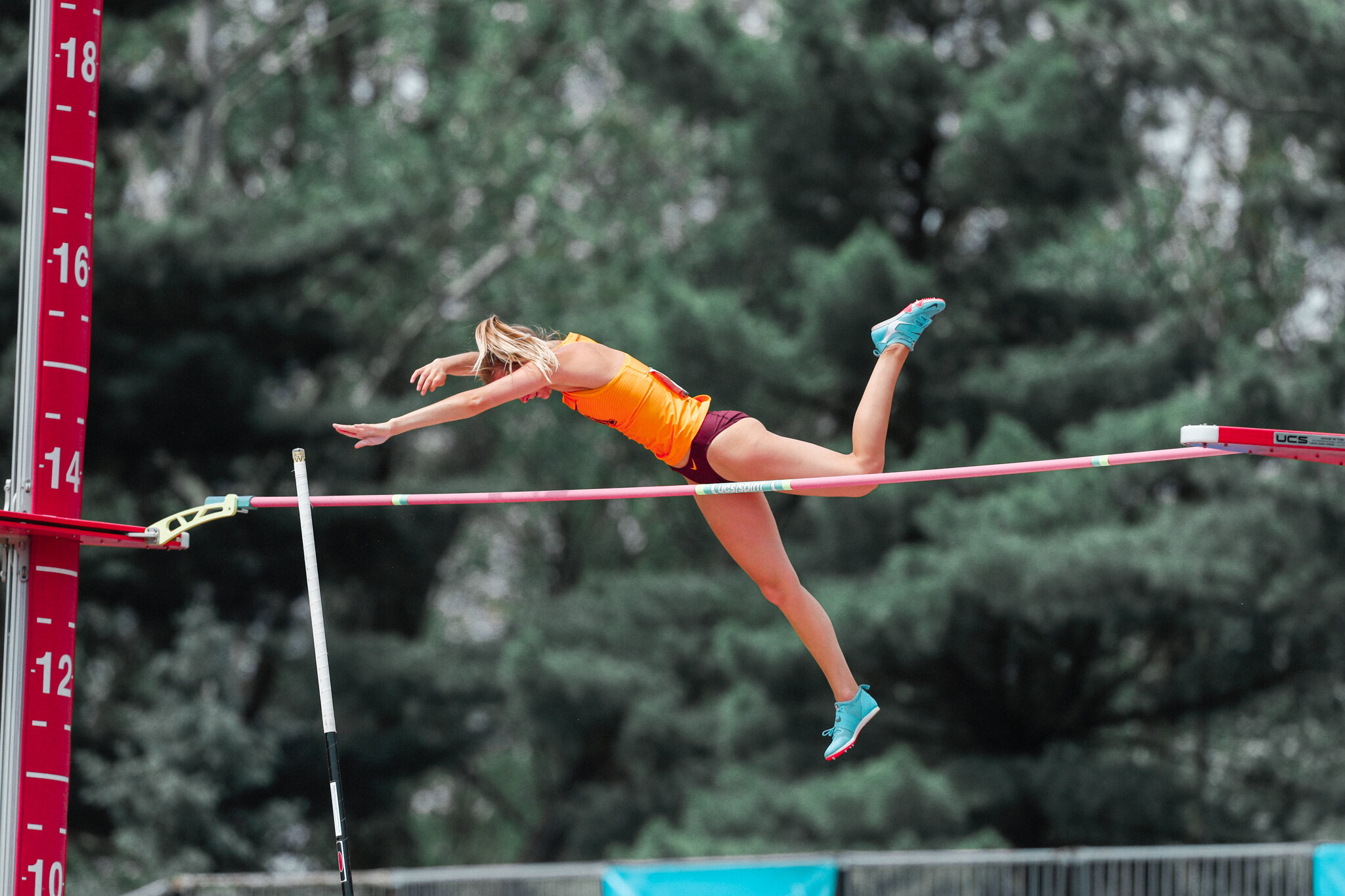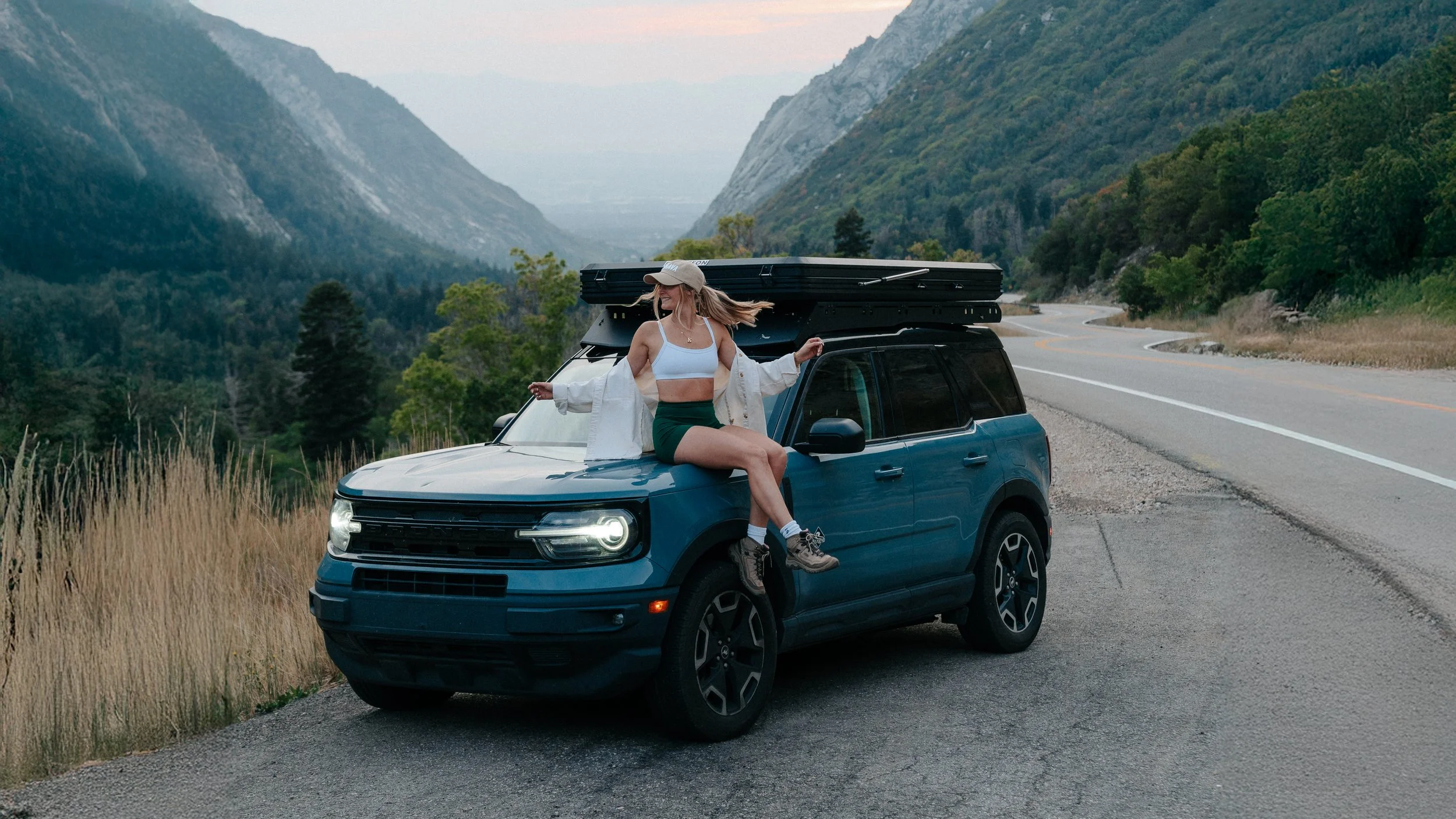Pole Vault For Beginners
You’re here because you have questions…
How do I learn to pole vault?
How do I get un-stuck at my current PR?
How high did YOU jump in highschool?
These are the most common questions I get in my DMs from young athletes who want to learn more about the sport. I love talking about my journey, and I love being able to help you guys with yours! Let’s get one thing straight. There is no magical solution to being a great vaulter. Instead, I will share with you some things that I learned in my 9-year journey from being a high school athlete to vaulting at a D1 level!
Note This article is primarily for those starting out in their track journey at the high school and younger level. If you're an established vaulter, just know this post is about the basics.
↓ Quotes from Pole Vault Legends ↓
Getting Started
If you are interested in vaulting but just have no idea how to start, this section is for you. You don't have to wait to get to high school to start learning about this event. You’d be surprised to hear that Pole Vault clubs exist all over the country. If you live near any major city, you're in luck of finding one. Pole vault clubs are ideal for individuals, especially those too young or lacking school resources for the sport. Seriously, just do a google search of your city and pole vault clubs in your area. In the meantime, fill your social media feeds with vault videos by following good vaulters and watching their jumps. Visualize yourself doing what they do, and study what a good jump looks like! You can also get stronger by learning how to lift and working on your sprinting form — which I’ll cover below!
My Story
(or at least the beginning.)
My name is Karlie Place. I started gymnastics around 5th grade and actually stuck with it until the end of high school. The body awareness I learned from the sport played heavily into my being a successful pole vaulter. If you're unsure of what body awareness means, just know it's a lot easier to throw yourself through the air when you can tell where the ground is, haha. I joined track in middle school but I didn't even know what pole vault was yet. I never looked into pole vault clubs because I didn’t know they existed. In high school, I found it important to keep doing track because it kept me in shape for gymnastics. Little did I know it was a lot more than that!
I had a lot of anxiety around running events. I recall purposely missing my scheduled running events from time to time — I’ve never admitted to that until now! I just wanted to do field events. My main event was triple jump and I only did pole vault here and there. My high school vault coach, Matt Kumershek saw my potential and urged me to focus more on pole vault than other events. He even would stand up for me with the other event coaches to buy me more time jumping. I’m glad he did because it eventually helped me pay for college! I don’t talk about my high school track experience very much because it is overall pretty average. I never won state, and the only records I broke were for our small high school. This is meant to be motivational. You can do anything you put your mind to! If you’re truly interested in continuing with pole vault in college, high school is just the beginning. Don’t stress and have fun with it. Since I know a lot of you reading this are in high school, I included my stats from year to year below.
I competed at the University of Wisconsin Milwaukee for 3 seasons breaking the NCAA Horizon League Conference record in 2016 with the height of 4.06m (13-3 ¾). In my junior year of college, I transferred to the University of Minnesota. I completed my NCAA DI Career in 2019 with a PR of 4.28 (14-0.5) and scoring points for two back to back Big10 championship teams - Indoor and Outdoor 2019. I competed at NCAA DI Indoor nationals in 2018 scoring 12th place and gaining Second team All-American status.
A few clubs I’ve had a great experience with:
Queen Creek, AZ
AZPVA - Run by Dean Starkey, a retired American pole vaulter who won a silver medal at the 1996 Atlanta Olympics. He is now the founder and head coach of AZPVA, a pole vault club in Arizona, USA, that trains athletes of all ages and skill levels in the sport of pole vaulting.
Minneapolis, MN
Flight Deck Athletics - Run by Caroline White and her husband. She was my college coach at the University of Minnesota.
Milwaukee, WI
Get Vertical - Jason Shimko is a former American pole vaulter who competed at the national and international levels. He is the founder and head coach of MKE Vault Club, which is a pole vault training facility located in Milwaukee, Wisconsin. Additionally, he organizes MKE Vault Fest, an annual pole vaulting event that brings together athletes of all skill levels to compete and celebrate the sport.
Pole Benders - Run by my former college coach Johnny Graham who is extremely passionate about coaching young athletes.
Garden City, Idaho
Dragila Vault Camps - Stacy Dragila, a retired American pole vaulter, holds a significant place as one of my personal heroes and a trailblazer for women in the sport. Renowned for winning the inaugural Olympic gold medal in the women's pole vault at the 2000 Sydney Olympics, Dragila further contributes to the sport's development through her establishment of the "Ultimate Air Pole Vault Club" in Idaho, USA.
Salt Lake City, Utah
UTPVA - Utah Pole Vault Academy - Utah Pole Vault Academy, located just outside of SLC, offers exceptional indoor facilities and coaching. Adults can enjoy the Friday night Adult Jump session, perfect for retired vaulters. Founded by Jeff and Megan Simonich, former pole vaulters themselves, the academy has a strong track record of training athletes for success at high school and collegiate levels.
Pole Vault Basics
If you’ve already been vaulting for a while and want more specific tips on training, This section is for you.
SPRINT FORM
I cannot stress enough how important it is to learn good sprinting form. You might not want to hear it, but being a good pole vaulter takes so much more than just having as many jump days as you can. The faster you are on the runway the higher you will jump. Take initiative to ask your coaches questions during your sprinting workouts on how you can be better. Film yourself doing sprints and compare it to good running form videos on youtube, like this one. Do all this without a pole so you can really focus on your body position. Once you feel like you’ve made some progress, then try to implement your form on the runway with a pole!
LIFT
Learn how to lift. This is the one I wish someone would have stressed to me as a high schooler. I never saw the benefit of lifting for a few reasons that were all wrong. I was self-conscious to be in the weight room and not know what I was doing. I wasn’t doing it right so I wasn’t seeing results. To put it in perspective, one time I was on the warm-up bikes with a friend in the weight room and the lifting coach overheard me say “I’m bad at weight-rooming.” A few days later my friend showed up to practice holding a shirt for me with my quote on the back…HAHA. Back on topic, lifting is extremely important. You should lift heavy and gain muscle in the offseason, then do what your coaches have planned for you during the year. Don’t be afraid to ask them questions, and don’t be self-conscious; everyone starts somewhere! Use titkok as a place to learn basics.
CORE
One word: core. This ties into lifting a little bit. I’m sure you’ve all seen some crazy exercises pole vaulters do to strengthen specific muscles you use to vault. For example, getting upside down in your vault is a lot easier with the core strength to do so. In college, we always did these exercises after a long jumping session. Here is a video that has a lot of different movements that will help our vault! It may be hard at first, but the more often you do them, the more you will be able to do.
Pole Vault Drills
Partner Plant Drill - EXAMPLE VIDEO
This drill is no joke. It can be potentially dangerous but the payout is huge if you use it correctly! It took me from 11’6 to 13’2 I one year! This one will teach you how to bend your pole. You should use a pole that is above your weight class. Not only will it be bearing your weight, but also the pressure that your coach is putting on your back. It could potentially break if you used a pole too small! The goal for you as the vaulter is to hold off your take-off position as long as you can. If you're weak, or if you lean to one side, you won't be able to stay off the ground and will fall to one side. Your coach just simply stabilizes you by putting two hands on your back. The rest is all you.
Step by step:
Stand facing the box with your top arm up and your pole snuggly in the box. Next, take 3 steps backward and mark that spot on the track. Start with your pole tip on the ground and your top arm bent so your fist is by your shoulder. Count down 3-2-1 with your coach who is ready to go with their hands on your back. Take your three steps towards the box, and punch up with your top hand as hard as you possibly can when you jump. That is the motion that you are training in this drill, and it’s something I think to myself EVERY full jump I take. PUNCH THE SKY!
This drill is for you to warm up your plant and really focus on the strength it takes to bend your pole. Basically, you hold your plant all the way through the vault and do not swing up. I do one to two of these on a meet day during my warm-up.
One More Jump Podcast by RISE Pole Vault
The One More Jump Podcast, hosted by Jake Winder of RISE Pole Vault, offers young aspiring pole vaulters an insightful journey into the world of athletics and life. Through engaging conversations with guests from various backgrounds, Winder explores the highs and lows of pursuing happiness and success in both sports and everyday life.
Thats it!
If you made it this far then I truly have faith in you as a young athlete who is taking initiative and trying to learn their own. You have a leg up on others who are just going through the motions.
Follow Along on Social
More on the Blog

























